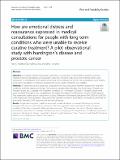Files in this item
How are emotional distress and reassurance expressed in medical consultations for people with long-term conditions who were unable to receive curative treatment? : a pilot observational study of Huntington's disease and prostate cancer
Item metadata
| dc.contributor.author | Anderson, Niall C. | |
| dc.contributor.author | Zhou, Yuefang | |
| dc.contributor.author | Humphris, Gerry | |
| dc.date.accessioned | 2021-11-04T17:30:07Z | |
| dc.date.available | 2021-11-04T17:30:07Z | |
| dc.date.issued | 2021-06-03 | |
| dc.identifier | 273672162 | |
| dc.identifier | 6949b46f-4cf9-473f-9c01-6e19dc06617b | |
| dc.identifier | 85107126962 | |
| dc.identifier | 000661924800001 | |
| dc.identifier.citation | Anderson , N C , Zhou , Y & Humphris , G 2021 , ' How are emotional distress and reassurance expressed in medical consultations for people with long-term conditions who were unable to receive curative treatment? a pilot observational study of Huntington's disease and prostate cancer ' , Pilot and Feasibility Studies , vol. 7 , 119 . https://doi.org/10.1186/s40814-021-00833-z | en |
| dc.identifier.issn | 2055-5784 | |
| dc.identifier.other | RIS: urn:2C1199C1E80CCD8C459200C5EF6D5DB8 | |
| dc.identifier.other | RIS: urn:2C1199C1E80CCD8C459200C5EF6D5DB8 | |
| dc.identifier.other | RIS: Anderson2021 | |
| dc.identifier.other | ORCID: /0000-0002-4601-8834/work/103137493 | |
| dc.identifier.uri | https://hdl.handle.net/10023/24261 | |
| dc.description.abstract | Objective It is unclear whether how people with long-term conditions express distress, and how clinicians respond, influences perceptions of consultation outcomes. The pilot study examined emotional distress and reassurance in consultations with people whose long-term conditions (at the time of consultations) were treated using active surveillance or symptom management (as no curative treatment was suitable). Methods An observational pilot study was conducted involving consultations between people with long-term conditions and their respective clinician. Consultations between three clinicians (two Huntington’s Disease; one Prostate Cancer) and 22 people with long-term conditions (11 Huntington’s Disease; 11 Prostate Cancer) were audio-recorded. Participants also completed an expanded Consultation and Relational Empathy (CARE) Measure. Two researchers coded sessions using Verona Coding Definitions of Emotional Sequences (VR-CoDES/VR-CoDES-P). Code frequencies were calculated, t tests performed between conditions, and Pearson’s correlations performed for associations between CARE responses and clinician utterances. Results People with long-term conditions expressed emotional distress on average 4.45 times per session, averaging 1.09 Concern and 3.36 Cue utterances. Clinicians responded with more explicit (2.59) and space-providing (3.36), than non-explicit (1.86) and space-reducing (1.09), responses per session. Clinicians expressed spontaneous reassurance on average 5.18 times per session, averaging 3.77 Cognitive and 1.5 Affective reassurance utterances. Huntington’s Disease consultations featured significantly more 'Cues', 'Concerns' and 'Overall' 'Emotional Distress', and 'Cognitive' and 'Overall' ‘Reassurance'. Conclusion Emotional distress was expressed more using hints than explicit concern utterances. Clinicians predominantly explicitly explored distress rather than providing information/advice and provided advice using spontaneous cognitive reassurance. People with Huntington’s Disease expressed more concerns and received more reassurance, indicating different needs between conditions. Future research is required to explore emotional distress and reassurance in a larger sample of participants and long-term condition types, and how the practical implications of these findings may be used to enhance outcomes of consultations. | |
| dc.format.extent | 11 | |
| dc.format.extent | 625236 | |
| dc.language.iso | eng | |
| dc.relation.ispartof | Pilot and Feasibility Studies | en |
| dc.subject | Affective reassurance | en |
| dc.subject | Cognitive reassurance | en |
| dc.subject | Emotional distress | en |
| dc.subject | Huntington's disease | en |
| dc.subject | Prostate cancer | en |
| dc.subject | RA Public aspects of medicine | en |
| dc.subject | RC0254 Neoplasms. Tumors. Oncology (including Cancer) | en |
| dc.subject | DAS | en |
| dc.subject | SDG 3 - Good Health and Well-being | en |
| dc.subject | MCC | en |
| dc.subject.lcc | RA | en |
| dc.subject.lcc | RC0254 | en |
| dc.title | How are emotional distress and reassurance expressed in medical consultations for people with long-term conditions who were unable to receive curative treatment? : a pilot observational study of Huntington's disease and prostate cancer | en |
| dc.type | Journal article | en |
| dc.contributor.institution | University of St Andrews. School of Medicine | en |
| dc.contributor.institution | University of St Andrews. Sir James Mackenzie Institute for Early Diagnosis | en |
| dc.contributor.institution | University of St Andrews. Population and Behavioural Science Division | en |
| dc.contributor.institution | University of St Andrews. WHO Collaborating Centre for International Child & Adolescent Health Policy | en |
| dc.contributor.institution | University of St Andrews. Health Psychology | en |
| dc.contributor.institution | University of St Andrews. St Andrews Sustainability Institute | en |
| dc.identifier.doi | 10.1186/s40814-021-00833-z | |
| dc.description.status | Peer reviewed | en |
This item appears in the following Collection(s)
Items in the St Andrews Research Repository are protected by copyright, with all rights reserved, unless otherwise indicated.

